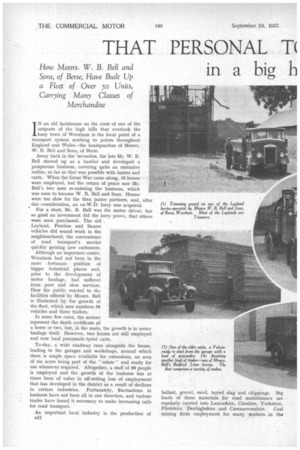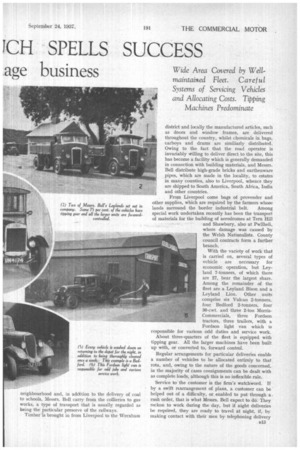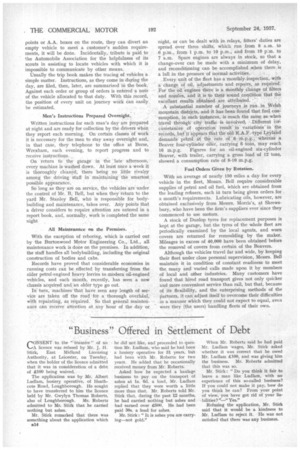THAT PERSONAL T( ICH SPELLS SUCCESS
Page 46

Page 47

Page 48

If you've noticed an error in this article please click here to report it so we can fix it.
in a big h age business
How Messrs. W. B. Bell and Sons, of Berse, Have Built up a Fleet of Over 50 Units, Carrying Many Classes of
Merchandise Wide Area Covered by Wellmaintained Fleet. Careful Systems of Servicing Vehicles and Allocating Costs. Tipping
Machines Predominate IN an old farmhouse on the crest of one of the outposts of the high hills that overlook the busy town of Wrexham is the focal point of a transport system working to points throughout England and Wales—the headquarters of Messrs. W. B. Bell and Sons, of Berse.
Away back in the 'seventies, the late Mr. W. B. Bell started up as a haulier and developed a prosperous business, covering quite an extensive radius, so far as that was possible with horses and carts. When the Great War came along, 10 horses were employed, but the return of peace saw Mr. Bell's two sons re-entering the business, which was soon to become W. B. Bell and Sons. Horses were too slow for the then junior partners, and, after due consideration, an ex-W.D. lorry was acquired. . For a start, Mr. B. Bell was the motor driver, but so good an investment did the lorry prove, that others were soon purchased. The old • Leyland, Peerless and Saurer vehicles did sound work in the neighbourhood, the convenience of road transport's service quickly gaining new customers. Although an important centre, Wrexham had not been in the more fortunate pOsition of bigger industrial places and, prior to the development of motor haulage, had suffered from poor and slow services. How the public reacted to the facilities offered by Messrs. Bell is illustrated by the growth of the fleet, which now numbers 50 vehicles and three trailers.
In some few cases, the motors represent the death certificate of a horse or two, but, in the main, the growth is in motor haulage itself. However, two horses are still employed and now haul pneumatic-tyred carts.
To-day, a wide roadway runs alongside the house, leading to the garages and workshops, around which there is ample space available for extensions, an area of six acres being part of the " estate " and ready for use whenever required. Altogether, a staff of 80 people is employed and the growth of the business has at times been of value in off-setting loss of employment that has developed in the district as a result of declines in certain industries. Fortunately, fluctuations in business have not been all in one direction, and various trades have found it necessary to make increasing calls for road transport.
An important local industry is the production of s12 ballast, gravel, sand, tarred slag and chippings. Big loads, of these materials for road maintenance are regularly carried into Lancashire, Cheshire, Yorkshire, Flintshire, Denbighshire and Caernarvonshire. Coal mining finds employment for many workers in the
neighbourhood and, in add+.-tion to the delivery of coal to schools, Messrs. Bell carry from the collieries to gas works, a type of transport that is usually regarded as being the particular preserve of the railways.
Timber is brought in from Liverpool to the Wrexham
district and locally the manufactured articles, such as• doors and window frames, are delivered throughout the country, whilst chemicals in bags, carboys and drums are similiarly distributed. Owing to the fact that the road operator is invariably willing to deliver direct to the site, this has become a facility which is generally demanded in connection with building materials, and Messrs. Bell distribute high-grade bricks and earthenware pipes, which are made in the locality, to estates in many counties, also to Liverpool, whence they are shipped to South America, South Africa, India and other countries.
From Liverpool come bags of provender and other supplies, which are required by the farmers whose lands surround the border industrial belt. Among special work undertaken recently has been the transport of materials for the building of aerodromes at Tern Hill and Shawbury, also at PwIlheli, where damage was caused by the Welsh Nationalists. County council contracts form a further branch.
With the variety of work that is carried on, several types of vehicle are necessary for economic operation, but Leyland 7-tonners, of which there are 27, bear the largest share. Among the remainder of the fleet are a Leyland Bison and a Leyland Lion. Other units comprise six Vulcan 2-tonners, four Bedford 2-tonners, four 30-cwt. and three 2-ton MorrisCommercials, three Fordson tractors, three trailers, with a Fordson light van which is responsible for various odd duties and service work.
About three-quarters of the • fleet is equipped with tipping gear. All the larger machines have been built up with, or converted to, forward control.
Regular arrangements for particular deliveries enable a number of vehicles to be allocated entirely to that rota, and, owing to the nature of the goods concerned, in the majority of cases consignments can be dealt with as complete loads, although this is no inflexible rule.
Service to the customer is the firm's watchword. If by a swift rearrangement of plans, a customer can be helped out of a difficulty, or enabled to put through a rush order, that is what Messrs. Bell expect to do. They reckon to work during the day, but if night deliveries be required, they are ready to travel at night, if, by making contact with their men by telephoning delivery points or A.A. boxes on the route, they can divert an empty vehicle to meet a customer's sudden requirements, it will be done. Incidentally, tribute is paid to the Automobile Association for the helpfulness of its scouts in assisting to locate vehicles with which it is impossible to communicate by other means.
Usually the trip book makes the tracing of vehicles a simple matter. Instructions, as they come in during the day, are filed, then, later, are summarized in the book. Against each order or group of orders is entered a note of the vehicle allocated to that duty. With this record, the position of every unit on journey work can easily be estimated.
Men's Instructions Prepared Overnight.
Written ,instructions for each man's day are Prepared at night and are ready for collection by the drivers when they report each morning. On certain classes of work it is necessary for the men to stay away overnight and, in that case, they telephone to the office at Berse, Wrexham, each evening, to report progress and to receive instructions.
On return to the garage in the late afternoon, • every machine is washed down. At least once a week it is thoroughly cleaned, there being no little rivalry among the driving staff in maintaining the smartest possible appearance.
So long as they are on service, the vehicles are under the control of Mr. B. Bell, but when they return to the yard Mr. Stanley Bell, who is responsible for bodybuilding and maintenance, takes over. Any points that a driver considers to require attention are entered in a report book, and, normally, work is 'completed the same night
All Maintenance on the Premises.
With the exception of reboring, which is carried out by the Buttonwood Motor Engineering Co., Ltd., all maintenance work is done on the premises. In addition, the staff handles all bodybuilding, including the original construction of bodies and cabs.
Records have proved that considerable economies in running costs can be effected by transferring from the older petrol-engined heavy lorries to modern oil-engined vehicles, and each month, recently, has seen a new chassis acquired and an older type go out.
In turn, machines that have seen any length of service are taken off the road for a thorough overhaul, with repainting, as required. So that general maintenance can receive attention at any hour of the day or night, or can be dealt with in relays, fitters' duties are spread over three shifts, which run from 8 a.m. to 6 p.m., from 1 p.m. to 10 p.m., and from 10 p.m. to 7 a.m. Spare engines are always in stock, so that a change-over can be made with a minimum of delay, and reconditioning can be accomplished when there is a lull in the pressure of normal. activities.
Every unit of the fleet has a monthly _inspection, with a change of Oil, adjustments and repairs, as required. For the oil engines there is a monthly change of filters and nozzles, and it is to their sound condition that the excellent results obtained are attributed.
A substantial number of journeys is run. in Welsh moantain districts, and it has been 'found that fuel consumption, in such instances, is much the same as when travel through city traffic is involved., Different Ciecurnstances , of operation 'result in variatiOni in the reCordS, but it appears that the old R.A.F.-type Leyland demands petrol at the rate of .6 m`.p.g., whereas a Beaver four-cylinder oiler, carrying 6 tons, may reach
16 m.p.g. Figures for an oil-engined six-cylinder Beaver, with trailer, carrying a gross load of 12 tons, showed a consumption rate of 8-10 m.p.g.
Fuel Orders Given by Rotation.
With an average of nearly 150 miles a day for every vehicle in the fleet, Messrs. Bell require considerable supplies of petrol and oil fuel, Which are obtained from the leading refiners, each in turn being given orders for . a month's requirements. Lubricating oils, however, are obtained exclusively from Messrs. Morris's, at Shrewsbury, who have been the firm's suppliers ever since they commenced to use motors.
A stock of Dunlop tyres for replacement purposes is kept at the garage, but the tyres of the whole fleet are periodically examined by the local agents, and worn covers are returned for remoulding by the maker. Mileages in excess of 40,000 have been obtained before the removal of covers from certain of the Beavers.
Although the vehicles travel far and wide, by keeping their fleet under close personal supervision, Messrs. Bell maintain it in condition of constant readiness to meet the many and varied calls made upon it by members of local and other industries. Many customers have found that hired road transport gives not only quicker and more convenient service than rail, but that, because of its flexibility, and the enterprising methods of the partners, it can adjust itself to overcome their difficulties in a manner which they could. not expect to equal, even were they (the users) handling fleets of their own.




























































































